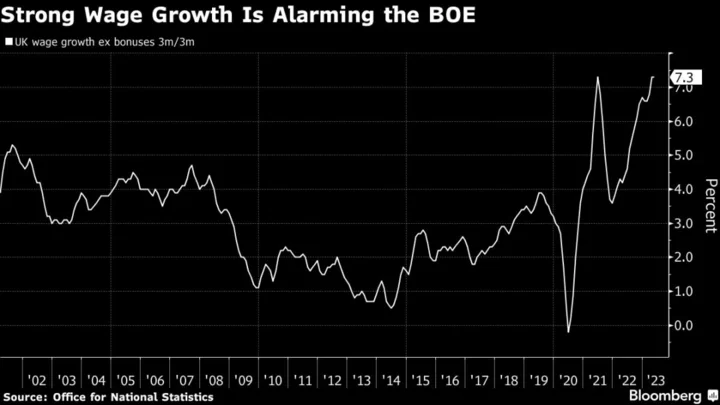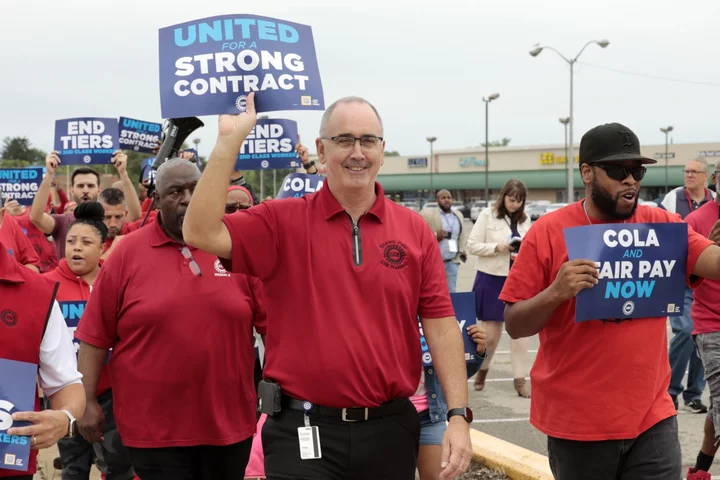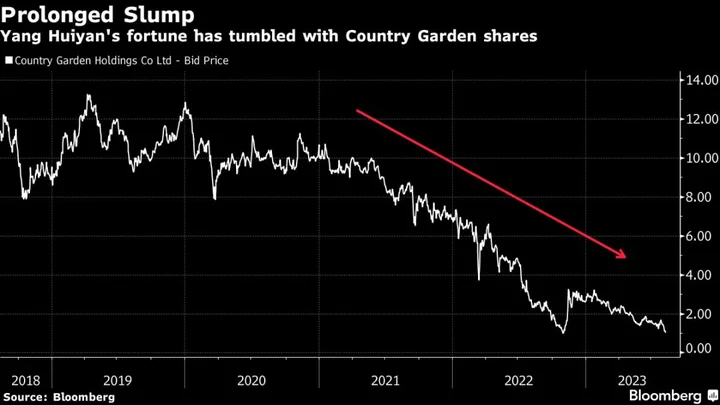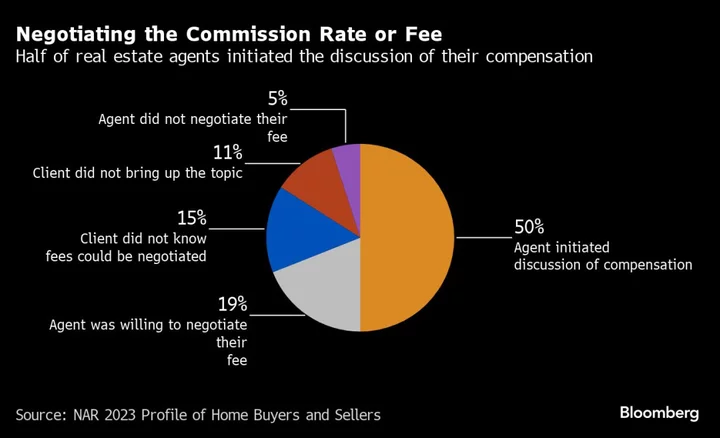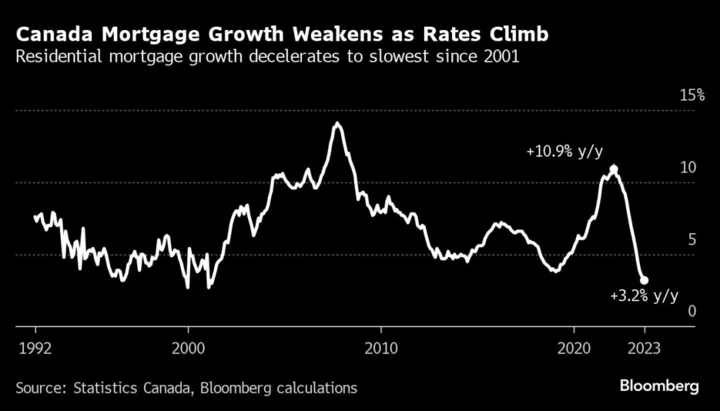Britain’s inflation fever may be starting to break, but data due out this week is expected to show the economy has more cooling to do before the Bank of England can change course on interest rates.
Official statistics are slated to show Tuesday that wages accelerated to the fastest pace on record in July, pushing up inflation in the services sector, according to a Bloomberg survey of economists. That will likely temper optimism about a subsequent report Wednesday that is forecast to show consumer price pressures eased to the lowest level in almost 1 1/2 years.
Such figures leave little reason yet for the Bank of England to end its longest cycle of interest rate hikes in three decades. Investors are betting that policymakers led by Governor Andrew Bailey will raise the key lending rate again in September and November, while the European Central Bank and US Federal Reserve have left the door open to a pause in their tightening.
“Taken together, the latest data suggest that strong wage growth will likely contribute to keeping inflation elevated in the coming months,” said Paula Bejarano Carbo, an economist at the National Institute of Economic & Social Research. “High nominal wage growth may contribute to making inflation more persistent.”
UK inflation probably slid to 6.7% in July from 7.9% the month before, according to the median forecast collected by Bloomberg. That compares with the latest reading of 3.2% in the US and 5.3% in the euro area.
Any decline in the headline number would be a relief to Prime Minister Rishi Sunak’s government, whose budget deficit is under growing strain from higher debt-service costs and demand from workers for more pay.
While the UK figure would be the lowest since early 2022, underlying pressures that exclude food and energy prices are likely to remain near their strongest level in three decades. The core measure of the Consumer Prices Index is expected to ease to 6.8% from the peak of 7.1% reached in May.
“We expect what I’d say would be a significant fall,” said Debapratim De, a senior economist at Deloitte. “It would be driven to a large extent by the fact that last year’s energy price rises in July would fall off the calculations. If inflation surprises to the upside and that means markets start pushing rate expectations up again, that would force the bank to act.”
What Bloomberg Economics Says ...
“Just how far did UK inflation fall in July? That’s the question the Bank of England and investors will be seeking an answer to in the coming week. We know headline inflation will drop on energy costs, but core inflation is likely to remain elevated. That should prompt the central bank to hike again in September and November.”
—Dan Hanson and Ana Andrade, Bloomberg Economics. Click for the WEEK AHEAD.
Inflation has fed through to government spending, which rose 5.7% from a year ago in June and was £2.3 billion ($2.9 billion) higher than the Office for Budget Responsibility forecast. The overshoot was due to a 6.4% increase in public-sector staff costs, a 22.9% rise in welfare benefits and the £3.6 billion cost of the energy support scheme for struggling households.
Lower inflation would relieve some of those pressures. But Bailey and the BOE say that upside risks to inflation are lingering and that policymakers probably will keep rates high until those pressures subside.
Labor market figures coming Tuesday are likely to show a more mixed bag. Unemployment is expected to remain at 4%. However, with recent surveys showing people returning to the workforce, some economists are expecting joblessness to tick higher.
Official data, are not expected to show any easing of wages pressures yet as scarce workers bid up wages. Average earnings growth excluding bonuses may tick up to 7.4% in the quarter through June from 7.3% in the previous three-month period. That would be the highest in records going back to 2001. The BOE has said the current pace of wage growth is incompatible with the 2% inflation target.
“There is also wage pressure from employers wanting to do the right thing by their staff if they can when the cost of living is high,” said Kitty Ussher, an economist at the Institute of Directors. “Conversely if employers start to believe we are through the worst because that’s what the data and the media says, we may see a reduction in wage growth.”
Those factors have left the BOE signaling that rates will remain at an elevated level for months if not years to ensure inflation is under control.
“It’s the last mile which obviously is where policy is really doing the work, and we’re going to have to see policy stay restrictive,” Bailey told Bloomberg TV on Aug. 3 after delivering a 14th consecutive rate hike.
Those increases have ratcheted up the cost of mortgages, eating into household budgets already strained by the biggest cost-of-living squeeze in generations. A YouGov survey showed consumer confidence dropped for a second month in July. The outlook for retail sales that month is also negative, reflecting chilly weather and concerns that rates would head much higher.
“Following a near uninterrupted upswing in consumer sentiment since November last year, British consumers have cooled on their assessment of economic conditions in recent months,” said Kay Neufeld, director at the Centre for Economics and Business Research, which helped conduct the survey.
UK economists have shaved their growth forecasts for next year to 0.5% from 0.6% in the past month, a poll by Bloomberg showed. It’s the lowest figure they’ve estimated since the survey started in early 2022.
While the main forecast is that the UK will avoid a recession, interest rates, now at 5.25%, are likely to peak at 5.75% in November, according to the survey. That would be the highest level since 2007 — just before the global financial crisis.
“We’re expecting inflation to gradually fall over the coming months,” said Yael Selfin, chief UK economist at KPMG. “The labor market is tight, and we’re expecting the labor market to remain tight. Wage growth will moderate relatively slowly, and we haven’t really seen that turn yet.”
Read more:
- UK Inflation Falls Below 8% in Breakthrough Against Price Spiral
- UK Borrowing Undershoot Raises Hopes for Tax Cuts Next Year
- Hot UK Wage Data Keeps Spotlight on Bank of England Rate Hikes
- UK Unemployment Up at Record Pace in Sign of Cooler Jobs Market
- UK’s Hottest June Ever Brings Unexpected Retail Sales Boost
--With assistance from Andrew Atkinson, Harumi Ichikura and Zoe Schneeweiss.

